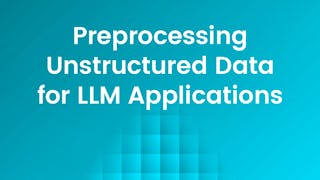Updated in May 2025.
This course now features Coursera Coach! A smarter way to learn with interactive, real-time conversations that help you test your knowledge, challenge assumptions, and deepen your understanding as you progress through the course. Unlock the full potential of unstructured data by mastering preprocessing techniques for LLMs and Retrieval-Augmented Generation (RAG) systems. This comprehensive course equips you with the skills to prepare unstructured data for advanced AI applications, ensuring high-quality input for improved outcomes. From understanding the complexities of data preprocessing to hands-on projects, you'll gain valuable insights into cutting-edge frameworks and tools. Your journey begins with setting up a robust development environment, including API accounts and key integrations. You'll then dive into the nuances of preprocessing unstructured data, tackling challenges such as data normalization, chunking, and metadata extraction. With the Unstructured Framework as your guide, you'll efficiently preprocess HTML, PDFs, and PPTX documents, ensuring optimal data structuring. The course emphasizes real-world applications, offering hands-on experience with semantic similarity, vector databases, and hybrid search strategies. You'll explore advanced document layout detection techniques, leveraging tools like Visual Transformers and LangChain to preprocess complex documents and extract meaningful insights. Finally, you'll apply all these skills in building a fully functional RAG system, integrating learned techniques for dynamic data interaction. This course is ideal for data engineers, AI practitioners, and developers looking to refine their preprocessing skills. While familiarity with Python and basic API usage is helpful, the course is structured for both intermediates and those seeking advanced expertise.















